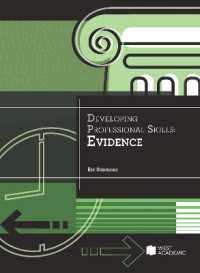- ホーム
- > 洋書
- > 英文書
- > History / World
Full Description
Social Psychology and the Ancient World: Methods and Applications fosters an interdisciplinary dialogue between classics and social psychology. Classicists use modern social-psychological insights to interpret ancient texts, while social psychologists engage with classical case studies to refine their own conceptual frameworks. This dialogue unfolds through an innovative structure: thematic sections introduced by social psychologists are paired with wide-ranging case studies by classicists, covering topics such as the psychology of tragic characters, comedic group dynamics, and the cognitive processes at play in oracles and deification. The volume offers methodological guidance for reconstructing the social psychology of past societies, addressing questions like: How did ancient Greeks understand character? How did laughter shape social cohesion? What role did emotional contagion play in narratives? How did ancient societies accommodate religious innovation? And above all: how do we know, and how can we properly investigate such questions?
Contents
Foreword
Preface
Notes on Contributors
1 Introduction: How to Do the Social Psychology of the Ancient World
Luuk Huitink and Ineke Sluiter
Part 1: The Psychology of Selfhood: Character and Individual
Introduction to Part 1: the Psychology of Selfhood Now and Then
Sandra Jovchelovitch
2 Taming the Extraordinary: Shifting Motives and the Psychology of Tragic Actors
Sheila Murnaghan
3 Individuals or Types? Ancient Criticism and Modern Psychology on Characterization in Greek Tragedy
Evert van Emde Boas
Part 2: Social Representations: the Role of Comedy and Satire
Introduction to Part 2: Social Representation in Practice
Gordon Sammut
4 Innovation, Group Psychology and the Comic Dêmos
Alexandra Hardwick
5 "Not by Others but by Our Own Feathers": a Social-Psychological Reading of Aristophanes' Birds
Xenia Makri
6 Cognitive Approaches to Ancient Satire: Rethinking the Laughter of Derision
Ralph M. Rosen
Part 3: Narrative Meaning-Making
Introduction to Part 3: Narrative Meaning-Making
Max J. van Duijn
7 Emotional Contagion, Empathy, and Sympathy as Responses to Verbal and Visual Narratives: Some Conceptual and Methodological Issues
Douglas Cairns
8 The Experience of Coincidence in Euripides' Ion
Jacqueline Klooster
9 Finding Orestes: Oracles and Abductive Reasoning
Michiel van Veldhuizen
Part 4: Imagination, Creativity, and Innovation
Introduction to Part 4: Imagination, Creativity, and Innovation across the Ages
Vlad P. Glăveanu
10 Playing Make-Believe with Objects: Counterfactual Imagination and Psychodrama in Greek Tragedy
Anne-Sophie Noel
11 The Posthumous Future in Sophocles' Oedipus at Colonus
Karen Bassi
Part 5: Accommodating New Concepts
Introduction to Part 5: Possibilities of Existence—Making and Changing Subjectivities and (Ancient) Worlds
Paula Castro
12 How the Ancient World Learned to Sin
David Konstan
13 Anchoring Religious Innovation: the Social Psychology of Deification in Athens 307 BCE
Thomas R. Martin
14 Cyrus' Learning Curve Views of Adolescent Psychology in Xenophon's Cyropaedia
Luuk Huitink and Eveline Crone
Index








